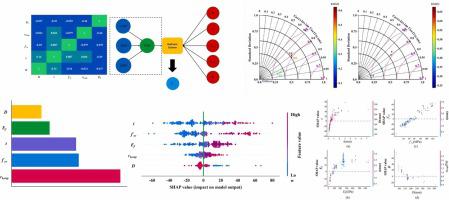当前位置:
X-MOL 学术
›
Mater. Today Commun.
›
论文详情
Our official English website, www.x-mol.net, welcomes your feedback! (Note: you will need to create a separate account there.)
Explainable machine learning: Compressive strength prediction of FRP-confined concrete column
Materials Today Communications ( IF 3.8 ) Pub Date : 2024-04-12 , DOI: 10.1016/j.mtcomm.2024.108883 Tianyu Hu , Hong Zhang , Cheng Cheng , Houxuan Li , Jianting Zhou
Materials Today Communications ( IF 3.8 ) Pub Date : 2024-04-12 , DOI: 10.1016/j.mtcomm.2024.108883 Tianyu Hu , Hong Zhang , Cheng Cheng , Houxuan Li , Jianting Zhou

|
Fibre reinforced polymers (FRP) are widely used for the strengthening of beams, slabs and columns due to their light weight and high strength. Compared to the traditional methods like steel cages or steel jackets, it reduces the time and economic cost significantly. This study focuses on the prediction of the compressive strength of FRP-confined concrete columns, which is influenced by multiple parameters. Initially, through experimental observations and the analysis of parameter mechanisms, the key parameters affecting compressive strength were identified. Six prediction models, namely linear regression, ridge regression, decision tree, random forest, and eXtreme Gradient Boosting, were subsequently constructed and evaluated to determine the optimal machine learning model. A comparison between the machine learning models and mathematical models was conducted. Furthermore, SHapley Additive exPlanation (SHAP) analysis was performed to ascertain the parameter importance and sensitivity of the machine learning model, and the analysis results were compared with existing models. The results indicate that compared to other machine learning and mathematical models, the eXtreme Gradient Boosting model demonstrates superior robustness and accuracy. The thickness and elastic modulus of FRP, as well as the concrete strength, are identified as crucial parameters that positively influence compressive strength. The relationships between the former two parameters and compressive strength follow a logarithmic function, while the relationship between concrete strength and compressive strength is approximately linear. These findings hold implications for the future development of codes and standards.
中文翻译:

可解释的机器学习:FRP 约束混凝土柱的抗压强度预测
纤维增强聚合物(FRP)因其重量轻、强度高而被广泛用于梁、板和柱的加固。与钢笼或钢外套等传统方法相比,它大大减少了时间和经济成本。本研究的重点是预测受多个参数影响的 FRP 约束混凝土柱的抗压强度。最初,通过实验观察和参数机制分析,确定了影响抗压强度的关键参数。随后构建并评估了六种预测模型,即线性回归、岭回归、决策树、随机森林和极限梯度提升,以确定最佳机器学习模型。对机器学习模型和数学模型进行了比较。此外,还进行了SHApley Additive exPlanation(SHAP)分析以确定机器学习模型的参数重要性和敏感性,并将分析结果与现有模型进行了比较。结果表明,与其他机器学习和数学模型相比,eXtreme Gradient Boosting 模型表现出卓越的鲁棒性和准确性。 FRP 的厚度和弹性模量以及混凝土强度被认为是对抗压强度产生积极影响的关键参数。前两个参数与抗压强度之间呈对数函数关系,而混凝土强度与抗压强度之间近似呈线性关系。这些发现对规范和标准的未来发展具有重要意义。
更新日期:2024-04-12
中文翻译:

可解释的机器学习:FRP 约束混凝土柱的抗压强度预测
纤维增强聚合物(FRP)因其重量轻、强度高而被广泛用于梁、板和柱的加固。与钢笼或钢外套等传统方法相比,它大大减少了时间和经济成本。本研究的重点是预测受多个参数影响的 FRP 约束混凝土柱的抗压强度。最初,通过实验观察和参数机制分析,确定了影响抗压强度的关键参数。随后构建并评估了六种预测模型,即线性回归、岭回归、决策树、随机森林和极限梯度提升,以确定最佳机器学习模型。对机器学习模型和数学模型进行了比较。此外,还进行了SHApley Additive exPlanation(SHAP)分析以确定机器学习模型的参数重要性和敏感性,并将分析结果与现有模型进行了比较。结果表明,与其他机器学习和数学模型相比,eXtreme Gradient Boosting 模型表现出卓越的鲁棒性和准确性。 FRP 的厚度和弹性模量以及混凝土强度被认为是对抗压强度产生积极影响的关键参数。前两个参数与抗压强度之间呈对数函数关系,而混凝土强度与抗压强度之间近似呈线性关系。这些发现对规范和标准的未来发展具有重要意义。



























 京公网安备 11010802027423号
京公网安备 11010802027423号